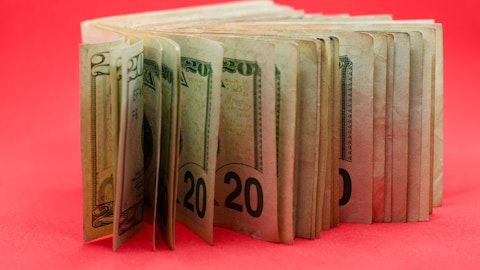Jim Cramer, the host of Mad Money, recently took a deep dive into the challenges facing the consumer packaged goods sector, offering his perspective on the factors driving the decline of these stocks.
“The recent decline in the consumer packaged goods stocks, I find it breathtaking… Why is this happening? The truth is, there are a host of reasons, and every time you think that things have gotten better, they seem to have gotten worse, much worse than you’ve imagined.”
READ ALSO Jim Cramer’s Thoughts on These 9 Stocks and Jim Cramer Discussed 10 Stocks Leading the Dow Higher in 2025
Cramer noted that many companies within the sector seem to believe that younger consumers will settle for smaller portions of food and that this might mitigate some of the challenges. While Cramer acknowledged that this shift in consumer behavior is part of the equation, he argued that many companies are overlooking the significant impact of GLP-1 weight loss drugs. These medications, which curb cravings for junk food, pose a serious threat, as Cramer sees them as something that could be widely adopted in the United States. He then added:
“Oh, and let’s not forget about the problem of tariffs. You’re getting some sudden price increases for many goods. Someone has to pay for the tariffs. These companies hope it will be you because if it’s not you, it’s them.”
Another significant challenge for companies in the packaged goods space is the difficulty of raising prices. Cramer explained that while many companies try to increase prices, they often face fierce competition from major retailers and online marketplaces, which offer private-label products that consumers increasingly recognize as being just as good as the branded alternatives.
While private labels are not seeing explosive growth at the moment, Cramer pointed out that they are exerting pressure on all prices, including those of established brands. Furthermore, Cramer observed that the price hikes implemented during the COVID-19 pandemic have led to consumer fatigue, with many shoppers now seeking better value.
“I don’t know what turns around the consumer packaged goods stocks, mergers would make sense. This new antitrust department probably blessed the concentration. Maybe the companies that slash prices the deepest ultimately win. No matter, this moment is untenable. The stocks can’t find their footing, just too many forces against them. These used to be safety stocks for heaven’s sake, but they’re safe no more.”

Jim Cramer on These 8 Stocks and the Packaged Goods Playbook
Our Methodology
For this article, we compiled a list of 8 stocks that were discussed by Jim Cramer during the episode of Mad Money on February 5. We listed the stocks in the order that Cramer mentioned them. We also provided hedge fund sentiment for each stock as of the third quarter of 2024, which was taken from Insider Monkey’s database of 900 hedge funds.
Why are we interested in the stocks that hedge funds pile into? The reason is simple: our research has shown that we can outperform the market by imitating the top stock picks of the best hedge funds. Our quarterly newsletter’s strategy selects 14 small-cap and large-cap stocks every quarter and has returned 275% since May 2014, beating its benchmark by 150 percentage points (see more details here).
Jim Cramer’s Thoughts On These 8 Stocks and the Packaged Goods Playbook
8. Chewy, Inc. (NYSE:CHWY)
Number of Hedge Fund Holders: 45
Cramer noted that Chewy, Inc.’s (NYSE:CHWY) private label products stand a good chance against brands by big names like Clorox because of their price points.
“Hey, you go to Chewy for cat litter and you find Fresh Step, that’s the Clorox brand. Then you see Frisco, the Chewy brand, and if the Clorox stuff gets too expensive, well, you might just easily go to Frisco. How much are you really gonna pay up for kitty litter?”
Chewy (NYSE:CHWY) is an e-commerce company that offers a wide range of pet products, including food, treats, supplies, medications, and services for various animals such as dogs, cats, and reptiles. Over the past year, the company stock went up over 110%.
Cramer has been a fan of Chewy (NYSE:CHWY), evident by his recent comment in January:
“Look, I like Chewy. I know that’s a pedestrian way to look at things, but I think that Chewy is the better bet for this group.”
7. Walmart Inc. (NYSE:WMT)
Number of Hedge Fund Holders: 88
Commenting on Walmart Inc. (NYSE:WMT), Cramer said:
“Walmart has private brands under this great value name that compete in the paper goods, pantry, staples, and cleaning supplies… And there’s a reason why Walmart and Costco keep hitting new highs. They put a ceiling on so many products, both by forcing the suppliers to keep prices down or by blitzing them with house brands that seem just as good at a lower price.”
Walmart (NYSE:WMT) is a leading retailer offering a wide assortment of products, such as groceries, health supplies, electronics, clothing, and store-branded items. It is worth noting that the stock gained more than 78% over the past year.
Additionally, as of November 2024, for FY 2025, Walmart (NYSE:WMT) expects net sales to increase by 4.8% to 5.1%, up from the projected increase of 3.75% to 4.75% on August 15, 2024, and a prior forecast of 3.0% to 4.0% as of February 20, 2024. Adjusted operating income is also expected to rise by 8.5% to 9.25%, compared to earlier projections of 6.5% to 8.0% in August and 4.0% to 6.0% in February.
6. Costco Wholesale Corporation (NASDAQ:COST)
Number of Hedge Fund Holders: 75
Cramer highlighted that Costco Wholesale Corporation’s (NASDAQ:COST) quality private-label products and low prices are contributing to its rise.
“If you’re in the consumer packaged goods business, you have a hard time raising prices because when it goes up too much, you’re gonna get bushwhacked by an Amazon or a Costco, both of which offer really terrific private label products that many shoppers know that are as good as the originals. We buy Costco Kirkland brand toilet paper… We know from the former Costco, CFO, Richard Galanti that if these companies charge too much, it’s easy to bring them down simply by creating a homegrown competition, the excellent Kirkland brand… And there’s a reason why Walmart and Costco keep hitting new highs. They put a ceiling on so many products, both by forcing the suppliers to keep prices down or by blitzing them with house brands that seem just as good at a lower price.”
Costco (NASDAQ:COST) operates a membership-only warehouse model, offering a variety of branded and private-label products in bulk at lower prices, appealing to customers looking for value on larger purchases.
5. Amazon.com, Inc. (NASDAQ:AMZN)
Number of Hedge Fund Holders: 286
Amazon.com, Inc. (NASDAQ:AMZN) was mentioned during the episode, and here’s what Cramer had to say:
“If you’re in the consumer packaged goods business, you have a hard time raising prices because when it goes up too much, you’re gonna get bushwhacked by an Amazon or a Costco, both of which offer really terrific private label products that many shoppers know, that are as good as the originals.… We’re comfortable with Amazon trash bags.”
Amazon (NASDAQ:AMZN) offers a diverse range of services, including e-commerce, advertising, and subscription-based offerings. Fred Alger Management stated the following regarding Amazon.com, Inc. (NASDAQ:AMZN) in its Q4 2024 investor letter:
“Amazon.com, Inc. (NASDAQ:AMZN) is a renowned online retailer and leader in cloud computing. The company’s Amazon Web Services (AWS) division offers utility-scale cloud solutions that support corporate America’s digital transition. During the quarter, Amazon’s shares contributed to performance as the company reported better-than-expected fiscal third-quarter results, with revenues and earnings beating analyst estimates. Operating margins expanded to 11%, driven by efficiency gains in logistics and robust AWS performance. Notably, AWS revenue growth accelerated during the quarter, along with recording its highest-ever operating margin of 38.1%, driven by easing cloud cost optimizations, renewed workload migrations, and an increasing contribution from AI workloads. On their earnings call, management highlighted plans to increase capital expenditures to enhance their technology infrastructure, catering to the surging demand for AI-driven computing.”
4. Kimberly-Clark Corporation (NYSE:KMB)
Number of Hedge Fund Holders: 45
Kimberly-Clark Corporation (NYSE:KMB) is a major producer of personal care and tissue products, offering a wide range of items including disposable hygiene products, facial tissues, paper towels, and professional hygiene solutions. Cramer commented, “Kimberly-Clark gave you a pretty darn good report last week, but people still weren’t happy. It goes on and on.”
Additionally, as mentioned in our article, Jim Cramer Discusses These 10 Stocks & DeepSeek’s Limitations, Cramer was bullish when discussing Kimberly-Clark (NYSE:KMB) toward the end of January. He said:
“Proctor’s done the best. I like the fact that Kimberly, initially people didn’t like the Kimberly-Clark call, but if you want the boring stock that can do well on that group, it’s shifting over to Kimberly.”
3. Mondelez International, Inc. (NASDAQ:MDLZ)
Number of Hedge Fund Holders: 51
Cramer mentioned that Mondelez International, Inc.’s (NASDAQ:MDLZ) challenges include the impact of weight loss drugs, the high price of a key ingredient, difficulty in raising prices, and tariffs.
“Mondelez reported a quarter that verified why the stock’s been falling. Though after a lower opening and dip, buyers did come in, the stock ended the day higher. That was more about the bond market I think…
For Mondelez, the problem isn’t just the GLP-1s softening demand for its candies and its biscuits, there’s also the cost element, the price of a key ingredient, cocoa, is incredibly high right now. Most people thought that would be temporary, but it’s held an astronomical level versus where it used to trade. Cocoa’s now about four times the price that Mondelez’s had to pay historically. That’s devastating to their margins. Plus, they can’t get away with the endless raising of prices like they used to. Oh, and let’s not forget about the problem of tariffs.”
Mondelez (NASDAQ:MDLZ) manufactures and sells a wide range of snack foods and beverages, including biscuits, chocolates, gums, candies, and various grocery products. Its brand portfolio includes popular names in cookies, crackers, chocolate, and snack bars.
2. The Clorox Company (NYSE:CLX)
Number of Hedge Fund Holders: 41
The Clorox Company (NYSE:CLX) manufactures and markets a wide range of consumer and professional products across various categories, including cleaning, disinfecting, household items, personal care, food products, and health supplements. Discussing how packaged goods stocks are getting hit these days, Cramer said, “Clorox got walled after a quarter that was not up to snuff.”
Cramer also noted that it is possible to get cheaper products than ones offered by Clorox (NYSE:CLX), giving the example of Chewy’s cat litter vs. Clorox’s Fresh Step cat litter. In January, Cramer discussed a few reasons behind the stock’s recent dips. Cramer noted that the challenges include rising long-term interest rates, which pressure dividend stock.
He also pointed out the growing pricing pressures from heavy discounts on products from major retailers and online marketplaces, making it harder for companies like Clorox (NYSE:CLX) to maintain margins. Cramer added:
“The dollar’s gotten too strong. These consumer packaged goods companies tend to be very big overseas. That’s not the case with Clorox, which is largely domestic. But you know how our stock market works. The consumer staples all trade together. If the dollar hurts a big international company like Procter & Gamble as it is, it’s gonna reverberate even into Clorox because they’re all in the same sector, and sector ETFs are like gravity.”
1. PepsiCo, Inc. (NASDAQ:PEP)
Number of Hedge Fund Holders: 58
Cramer deep-dived into a significant challenge that PepsiCo, Inc. (NASDAQ:PEP) is facing: effects of the weight loss drugs and changes in eating habits.
“The other day, PepsiCo got crushed on weaker than expected earnings… So take PepsiCo, I don’t know if people realize how excellent this company really is. The stock always carried a premium price to earnings multiple, meaning we’re willing to pay extra for its profits. They have terrific brands at Pepsi, Mountain Dew… FritoLay, the latter being one of the most dependable of all staples.
But now PepsiCo’s got a problem because FritoLay is not delivering the consistent numbers that it used to. Why? Management says it’s because younger generations fixate on health and there’s nothing particularly healthy about potato chips or Cheetos. They’ll buy smaller portions. That’s what their hope is. Me? Look, I’m sure that a part, that’s a part of it, but I do think that PepsiCo’s in somewhat of denial about the impact of GLP-1 weight loss drugs from Novo Nordisk, which reported a terrific quarter this morning, and Eli Lilly, which reports tomorrow.”
Cramer then highlighted that taking these weight loss drugs can result in lowered cravings for junk food. Moreover, he noted that they could be used by up to 40 million people in the U.S., a number that might be on the lower side considering that 42% of American adults are obese.”
PepsiCo, Inc. (NASDAQ:PEP) is a leading company in the manufacturing, promotion, and distribution of a wide range of beverages and snack products, including popular brands like Lay’s, Gatorade, Pepsi, Doritos, Tropicana, and Aquafina.
While we acknowledge the potential of PepsiCo, Inc. (NASDAQ:PEP) as an investment, our conviction lies in the belief that AI stocks hold greater promise for delivering higher returns and doing so within a shorter timeframe. If you are looking for an AI stock that is more promising than PEP but that trades at less than 5 times its earnings, check out our report about the cheapest AI stock.
READ NEXT: 20 Best AI Stocks To Buy Now and Complete List of 59 AI Companies Under $2 Billion in Market Cap.
Disclosure: None. This article was originally published at Insider Monkey.





